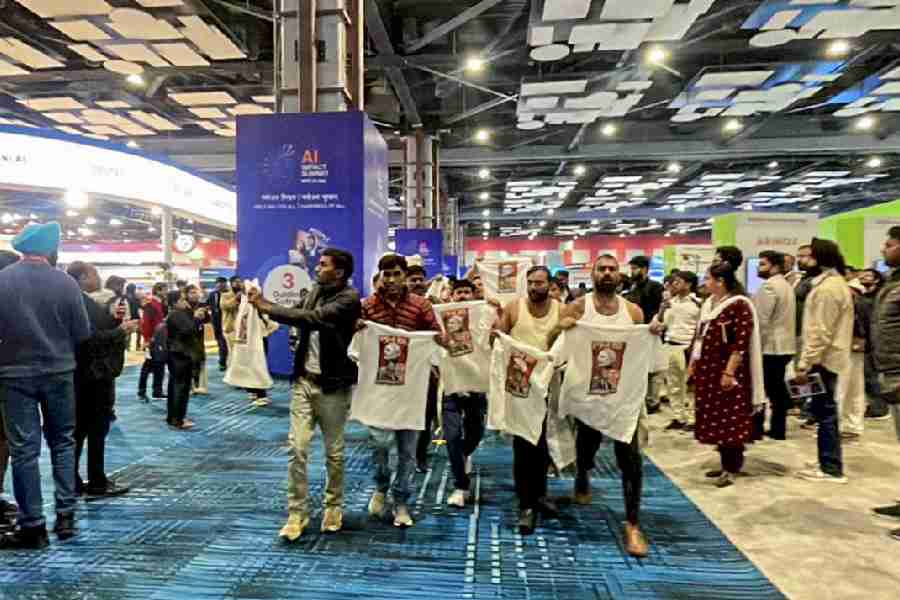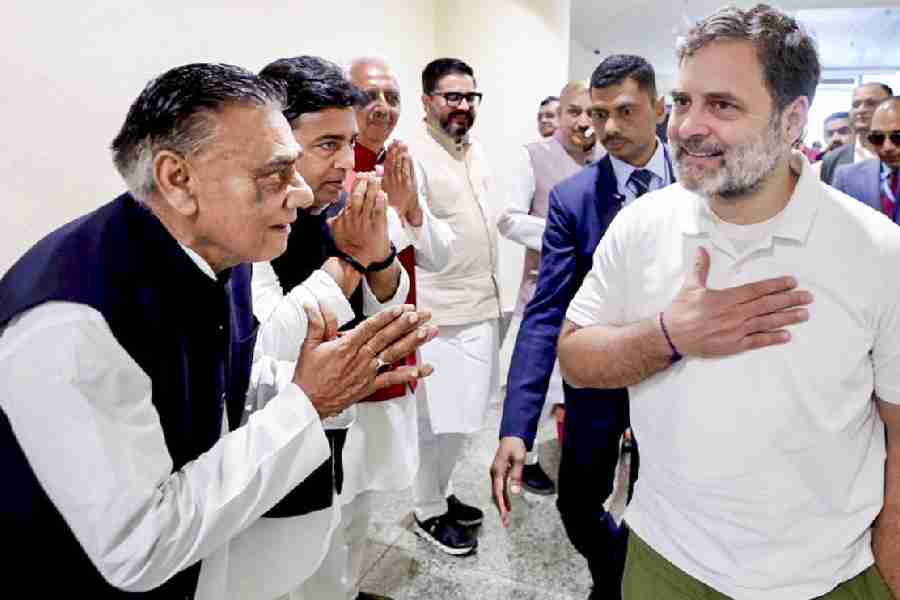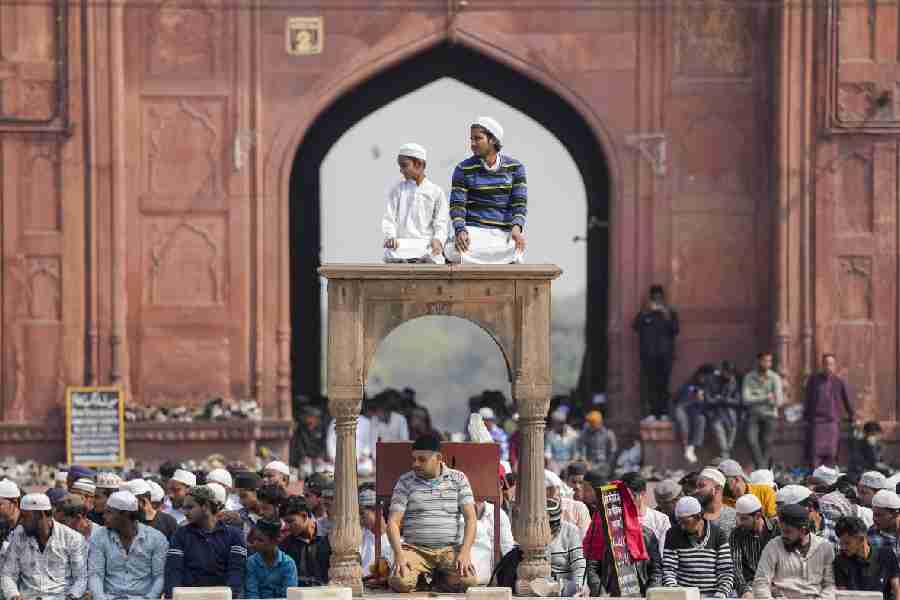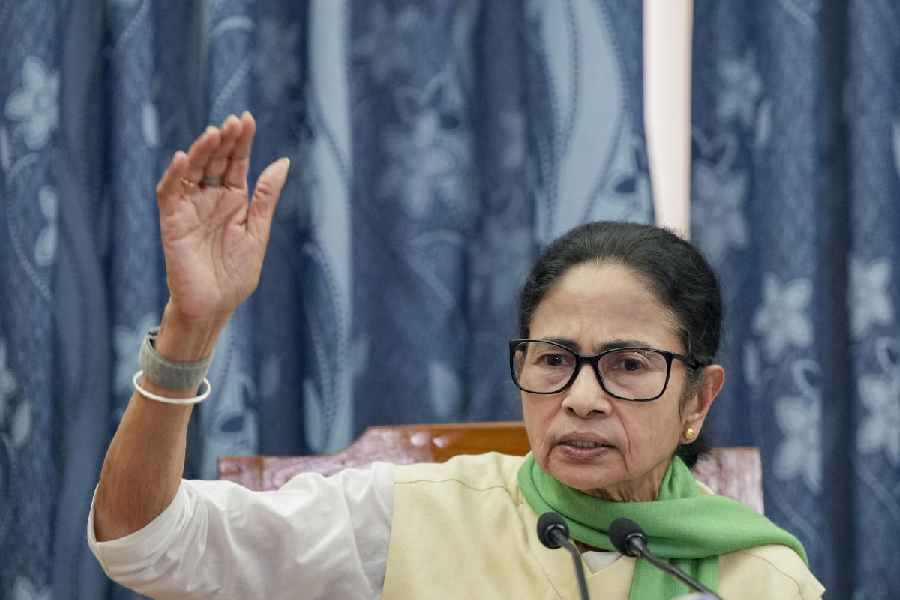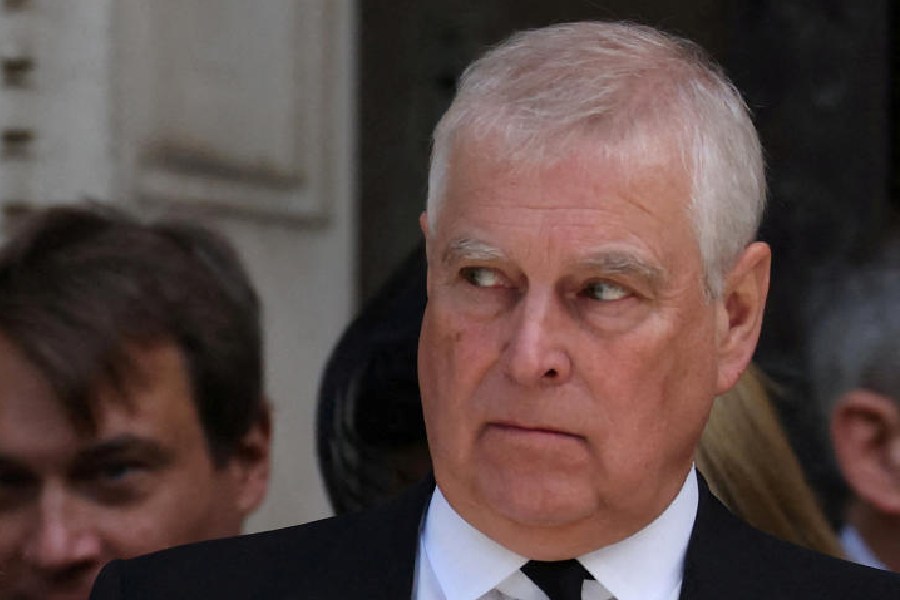 |
| Indrani Deb Barman in front of her sister Chandrani Saha’s picture in their Behala house. Picture by Amit Datta. lDid you lose a loved one in the AMRI tragedy. Tell ttmetro@abpmail.com |
‘My sister was sleeping heavily sedated’
Chandrani Saha, 36, a senior scientific officer in a research firm, and her husband Nilabjo Haldar were injured in a road accident at Singur while driving back to the city from Mukutmanipur on December 7. She had fractured her legs, he his arm. They were admitted to a hospital in Singur before being shifted to AMRI Dhakuria. A sedated Chandrani died in Friday’s fire, abandoned in the ITU. Nilabjo managed to make it to safety. On Sunday, Chandrani’s sister Indrani Deb Barman, a Bangalore-based IT professional, performed her last rites at their Sashi Bhushan Mukherjee Road house in Behala. Later, Indrani spoke to Metro sitting near her sister’s picture, struggling to hold back tears.
Chandrani and I had lost our mother as children, so we were exceptionally close. I was the one who had insisted that she be admitted to AMRI. I came down to Calcutta as soon as I heard about the accident and would not let her get treated at Singur or anywhere else. I thought AMRI would take good care of her. She was admitted to ITU bed No. 2410 on December 7 at 4.30pm.
We were asleep at home when Nilabjo called at dawn and informed us of the fire. His arm had been operated on the day before. He was in a semi-conscious state on the second floor of the hospital. When he realised there was a fire, he took off the oxygen mask and the drips and ran out of the building. Remembering that Chandrani was on the fourth floor, he tried to go back and save her but was not allowed to. That’s when he called us in a state of panic and confusion.
Chandrani was sleeping heavily sedated and I don’t know whether she even realised that there was a fire. Even if she had, she would not have been able to run with a fractured leg.
My friends, relatives and I rushed to the hospital but were not allowed in before 11-11.30am. Till then, the family members of patients were forced to be mere spectators to the disaster. The firemen and the hospital personnel were only interested in saving the property. They made little effort to evacuate the helpless patients. In fact, the ITU staff ran to safety, leaving the patients behind. Residents of the neighbouring areas had to keep asking the rescue personnel to break the glass panes. All through, the hospital staff told me that my sister was fine, though she had already died.
We were asked to search for our relatives from a pile of bodies. I managed to speak to the chief minister when she visited the hospital. I asked why I had to lose my sister. She could only say that she had cancelled AMRI’s licence. But she was a big help otherwise. She got the bodies released fast, otherwise there would have been a bigger mess. My sister’s body was in SSKM.
‘My father died... just like in a concentration camp’
 |
| Jaharlal Ganguly |
Rina Ganguly, the widow of 67-year-old Jaharlal Ganguly, is trying hard to be brave. “We are a jolly family. Friends drop in all the time. Only now my husband is not there anymore,” she said on Sunday as calmly as she could. Sitting in their flat off James Long Sarani, her son Raja Ganguly, zonal sales manager at a private firm, spoke about his father’ s death.
I cannot get over the fact that my father survived a road accident only to die at AMRI this way. Eight months ago, a motorcycle had hit my father. Most people do not survive such an accident. But ever the fighter, he bounced back. He was bed-ridden for three months. Since his recovery he was shaky about going out of the house. After returning from a wedding on December 7, he suffered cerebral haemorrhage. As I was in Mumbai on an official tour, my colleagues helped him get admitted to AMRI Hospitals because a doctor of our choice works at there.
When I returned from Mumbai, doctors told me that he had a 50 per cent chance of making it. But since he was restless, they had to tie his hands and legs to the bed in the ICU. That’s how he died. He could not have moved, even if he had tried.
I was spending the December 8 night in the hospital lobby with my brother-in-law. We called the ICU at 3.30am and were told that my father was doing well. Just then, we saw guards running with fire extinguishers. I realised there was a fire and ran to the fourth floor and told the ICU staff that I would like to take away my father. They told me that patients are always safe in an ICU and I believed them. I went down and was not allowed to go up after that.
The firemen were more interested in saving the hospital property than lives. The rescue operation began too late. The poor hospital infrastructure and lack of co-ordination between the administration and rescue personnel caused my father’s death. I will always live with the knowledge that my father died in a hospital with his limbs tied, just like in a concentration camp.
Only the chief minister seemed to care about us. She helped us claim the bodies of near ones fast after the post-mortem.
‘We had to find her in a pile of bodies’
 |
| Anita Roy at her home on Sunday. Her mother-in-law Dipti’s picture is in front of her. (Amit Datta) |
Anita Roy is angry. Medical neglect had claimed her husband 10 years ago. On Friday, her 81-year-old mother-in-law, Dipti Roy, died in the fire, the victim of another kind of neglect. Dipti had been admitted to AMRI after she developed chest congestion, as the family did not want to take a chance. Sitting in their Regent Estate flat, Anita recounted the terrible consequence.
My mother-in-law was a cancer patient and would go to the AMRI oncology department for treatment. I always felt the hospital was unsafe. The lack of fire exits and the inadequate number of sprinklers had always bothered me. Why did not the fire department ensure that it complied with the safety standards?
Nobody bothered to inform us after the fire broke out. Is it not the hospital’s job to inform the relatives of patients about a fire? We were alerted by relatives who had switched on the TV in the morning. After reaching the hospital, we realised that little effort had been made to rescue the ICU and ITU patients.
My mother-in-law, who was in the ITU, was to be released on Saturday. But as fate would have it, we had to find her in a pile of bodies at SSKM Hospital a day before. The sight and smell would haunt me and my sons all our lives.
But nobody cared. Is this what our health system has come to? The political leaders were there to gain mileage out of the tragedy. Except the chief minister, nobody was helping the victims. My two sons are so angry that they do not want to meet anybody now. A lot will be written about AMRI now but then things will go back to normal. Only we will have to live with our void and nightmares.
‘He would have been fine in a few days’
 |
| Madhusudan Hazra |
Madhusudan Hazra, 72, had to be admitted to hospital twice in a serious condition so when he developed breathing trouble earlier this month, his family members decided to be cautious and took him to AMRI Dhakuria. Sitting in their Kasba flat, his son Santanu said he would always regret the decision.
My father used to have problems breathing because water accumulated in his lungs. On earlier occasions, he had been admitted in the main building. This time, he was on the third floor of the annexe building. The illness was not serious and he would have been fine in a few days.
On Friday morning, I received a call from my brother, who stays in our other home near the hospital. He told me that a big fire had broken out and many patients were feared dead. It was about 6.30am. No one from the hospital had bothered to call us.
I rushed to the hospital with my family and my 60-year-old mother. There was utter chaos and confusion. No official from the hospital could say where the patients were. I somehow managed to push through the crowd. Boys from the neighbouring slums rescuing patients took me to the third floor up the staircase. I could not enter the ITU as there was thick smoke between the staircase and the room’s door. I had to come back without even making an attempt to see if my father was alive.
Firemen working there told me that there was little chance of anyone in that ward surviving. They requested me to go down as I could fall sick. It was too hot and I was forced to go down. A couple of hours later I found my father among the bodies in the main building. We were prepared for another round of chaos while receiving the body at SSKM but the chief minister’s presence made things easier for us.”
‘My father did not deserve to die like this’
 |
| Urmimala Mazumdar at home. (Sayantan Ghosh) |
Kamal Mazumdar, 62, a resident of Jodhpur Park, had been admitted to AMRI, Dhakuria on December 5 for radiation therapy to treat cancer. The pharmacist died on the second floor of Annexe 1, while his family members — wife Madhumita, daughters Romilla Dutta and Urmimala — tried in vain to get to him. Urmimala, 26, recounts her nightmare:
My father was suffering from cancer for the last three years. He was going to AMRI every day for radiation therapy but it was taking a toll on his health so we decided to admit him on December 5. My sister and her husband came down from Delhi because we had decided that we would all be together when he went through his treatment.
Around 6.30am, we got a call from my aunt saying that she had heard there was a fire at AMRI. I frantically started calling the hospital landlines and helplines but no one answered. I rushed to the hospital.
 |
| Kamal Mazumdar |
There was complete chaos. There were bodies being pulled out. We didn't know if they were dead or alive. I spotted the male attendant my father had but he disappeared in the crowd. There was almost no one from the hospital there and people had started vandalising the building. There was one list that was being circulated repeatedly without any updates. When it was announced that people were being transferred to different hospitals, we all decided to spread out and look for my father.
I ended up going to SSKM but we were not being allowed near the bodies. When Mamata Banerjee came, I went to her for help. She told me that it would take some time to identify the bodies and that she was arranging for coloured photographs to be taken so that it could be done faster.
I don’t know when we would have found my father if it hadn’t been for her help. We got his body around 3.30pm.
My father did not deserve to die like this. The hospital staff had been calling up my aunt earlier, asking if we had arranged for the money needed for the treatment, but no one bothered to inform us that a fire had broken out or to give us basic information about the whereabouts of the patient.
I share this grief with all the people who have lost their loved ones. But the emptiness inside me will never be filled…. I am the one who lost a father.
‘He could not shout for help and he could not move’
Puranmal Agarwal, 72, was battling cancer for the past one-and-a-half years. After treatment in Mumbai and then Apollo Hospitals in Calcutta, the Agarwal family, who are in the jewellery business, shifted Puranmal to AMRI. He was beginning to show signs of recovery…. Surrounded by relatives in their 29A Ballygunge Park flat on Sunday, Hemant Agarwal, 25, spoke about losing his grandfather.
 |
| Puranmal Agarwal |
My grandfather had been in AMRI for the past one month. Just 15 days ago, he seemed to be responding to medicines and the ulcers on his throat were shrinking. For the first time in months we were hopeful. But…
He had a room on the second floor and we had kept a private nurse with him. She called us around 3.45am saying that she thought there was a fire in the hospital and that there were no hospital attendants around. She asked us to come fast.
My father, uncle, brother and I left for the hospital immediately and reached around 4.15am. The nurse then came out crying saying that she could not save him. She told us that she had gone out into the corridor around 3am saying that my grandfather was having trouble breathing as there was smoke. She was sent back to the room by the nurses on the floor who said there was nothing to worry about. This went on for half-an-hour and the last time she came out, she saw that the corridor was empty. That is when she called us.
My grandfather was heavy and she could not carry him. He had almost lost his voice so he could not shout for help and he could not move. When we found him, his eyes were open. So he did not die in his sleep. He had choked…. I just hope that it was over quickly and that he did not have to suffer.
Such a big hospital and there was no one there to help. The local people were helping a lot and then Mamata Banerjee came in and controlled the situation. I spoke to the chief minister five times. I am a common man but she helped. I don't think we would have got the body if it hadn't been for her.
I hope some action will be taken so that the AMRI people can be taught a lesson. People go to hospitals to get care not to die.
‘What shocked me is the callousness of the hospital’
 |
| Purnima Roy Chowdhury |
Purnima Roy Chowdhury, 67, was admitted to the female neurology ward on the second floor of Annexe 1 of AMRI Dhakuria. The retired employee of the state health department lost her husband in 2008 and was barely able to walk. She underwent a spine surgery in the hospital on December 3. Her son Anirudhha Roy Chowdhury, a senior bank official, relived the nightmare at his Bijoygarh house:
I was satisfied with the treatment my mother received at the hospital. She could not walk as her right leg was partially numb. She was undergoing physiotherapy after the surgery and was to be discharged in another three-four days. Doctors said she would be able to walk again. We were hopeful and happy. But suddenly everything changed.
What shocked me is the callousness of the hospital administration. My mother was admitted there but they did not bother to inform me when the fire broke out. A friend called around 6.30am to tell me that a fire had broken out at AMRI.
I, along with my friends, immediately headed for the hospital on two-wheelers. There was total chaos when we reached. No one knew where to direct us. No one had any information about the patients. The search for the body was just unbearable. We went to the AMRI hospitals at Salt Lake and Mukundapur but could not find her body. We returned to the Dhakuria hospital and approached police commissioner R.K. Pachnanda who was present there. He told us to go to SSKM Hospital, where we finally found her. The release of the body was smooth.
When the hospital charges you so much, you expect basic safety measures to be in place. I had paid Rs 1.47 lakh as hospital charges. What did I get in return? There was no rescue system in place. The cabins were locked, suffocating glass rooms. Unfortunately, this realisation has come after everything has been lost.
(As told to Chandreyee Chatterjee, Chandreyee Ghosh and Subhojoy Roy)





